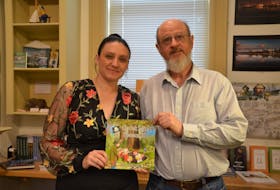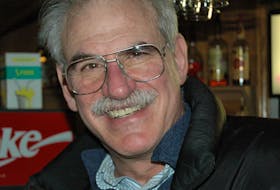NICTAUX, N.S. — Relentless winds whipped the bitter ocean air against the able seaman’s skin.
The upper deck of the HMCS Cobalt corvette offered an uninhibited view of the pounding North Atlantic, but no shelter.
A young Leonard Gaudet scanned the horizon come sunshine or sleet, in darkness and light.
His task made finding a needle in a haystack look like child’s play.
“You were out there on a ship, an easy target and you knew there was somebody looking for you and you just went on to whatever you were assigned to do and if you were attacked, you knew what to do about it,” the Second World War veteran recalled in a recent interview from his Nictaux South home.
“You were looking for a black pipe sticking out of the water, or anything as far as that goes. In pitch dark, you still had to do it.”

Sopping wet or riled by the churning sea, he remained in position. A standard watch shift spanned four hours – no exceptions.
HMCS Cobalt’s crew scoured the sea for signs of submerged German U-boats lurking under the water.
“These guys were underwater and we couldn’t see them, but they were there looking at us. We couldn’t see our enemy. We could hear them on sonar. We knew they were there, but we couldn’t see them,” Gaudet said.
“Scary – very scary. You were just waiting.”
Scan dead ahead. Cover 90 degrees. Repeat.
“You come to a point when you think you see something, but you don’t,” said Gaudet, reflecting on the tricks a fatigued mind would play.
The escort convoy, at times including 40 to 50 ships, was constantly at risk while crossing enemy-ridden waters with merchant vessels carrying supplies for allied troops overseas.
Gaudet’s mind would race. He wondered when they’d be under fire, where it would come from and where the enemies were aiming.
“We didn’t know. We just waited for the boom. We didn’t know who was going to get it.”
READY AND WILLING
The Digby County native left his hometown of Little Brook in 1943. He enlisted in Halifax at 19 and trained in Cornwallis.
Gaudet had no qualms about joining the war effort.
“Everybody went. We thought we were smart,” he said, noting that his brother had the same mentality.
His father served in the First World War but did not encourage his sons to follow in his footsteps. He didn’t stand in their way, either.
“He went through hell, so he didn’t want to talk about it – can’t blame him for that.”
Gaudet quit school at 16 to work at a shipyard in Meteghan, building minesweepers for the British navy.
Three years later, he was off to serve his country.
“I was glad. I thought I was a man. I had a uniform on, and I was going out in the world. I was a big boy.”
His eyes were too bad for the air force, and his older brother advised against joining the army.
“My brother was army and he came home one time and he said, ‘For God’s sake, if you don’t like walking… join the air force or the navy,” Gaudet recalled.
He questioned his brother’s advice more than a few times as HMCS Cobalt was “pounded on the North Atlantic day and night for days and days.”
On a quiet day, water and ships stretched on for as far as the eye could see.
And then there were days they yearned for quiet.
RISKY MISSIONS
The sound of the alarm still rings in Gaudet’s 95-year-old mind at times.
Action station commands are as clear today as they were in the mid-1940s.
“The bell, the siren - and you’d run like hell,” he recounted.
“Even the cook had a job, help loading guns or help loading depth charges. Everybody had a job to do when you went into action.”
Gaudet, a gunner, was regularly tasked with depth charges and the scattering Hedgehog bombs targeting submarines.
“You just run and do it,” he said. “You don’t think about anything. You do it.”
HMCS Cobalt travelled in front of the convoy.
He remembers tornados whizzing by, occasionally striking allied vessels.
“You kept on going, couldn’t stop,” he said.
“The escort on the rear would pick ‘em up if he could but we weren’t allowed to stop… supplies had to go to England and there’s no stopping – you go.”

Gaudet can still recite his regimental number like clockwork.

To this day, he proudly puts names to faces in a war-time photo of the Cobalt’s crew.
“I knew them all,” he beams.
He has fond memories of feeling pretty good after the crew celebrated the war’s end with shots of spiced rum.
Camaraderie was not lost amid the chaos.
Happier times at sea involved comrades strumming a guitar or playing the mouth organ.
Gaudet smirks before reciting a rhyme inspired by one of their go-to canned food options.
“Carnation Milk, the best of all. No tits to pull, no tits to haul. Two holes in the can – that’s all.”
SOFT HEART
Reflections of lighter moments offer a welcome contrast to flashbacks that jostle him awake in the middle of the night.
“You think of all of this stuff and it all rattles your brain. It’s tough.”
His late wife, Dora Gaudet, was his rock for 63 years.
The pair raised six children. He worked for the Department of Transportation in Middleton for 35 years. She tended to the home.
Dora endured lung cancer, a broken hip, and pneumonia before passing away at 89 in July.
His first wife died of cancer at 25.
But life’s hardships have far from left Gaudet hardened.
He finds comfort in watching wildlife enjoy the lush, green field lining his peaceful rural property. He lights up as he watches a stray kitten that made its way into his garage wobble to the food bowl he puts out each day.
“You couldn’t pay me to kill an animal, no matter what. I’ve got a bunch of raccoons here in my garage, but I like ‘em,” he said with a warm smile.
He looks back on his long life with gratitude. The war, he said, taught him discipline.
“You do as your told. You don’t say when, you do it. It helped me to respect people – anybody. Black, white – it doesn’t matter what you are,” he said.
The Annapolis County veteran is thankful to the organizations hosting Remembrance Day services each year on Nov. 11, and he proudly attends Middleton’s on an annual basis.
“I volunteered for that. Nobody pushed me in and what happened to me in those years, I survived,” he said.
“I’ve got no quarrels with nobody.”








